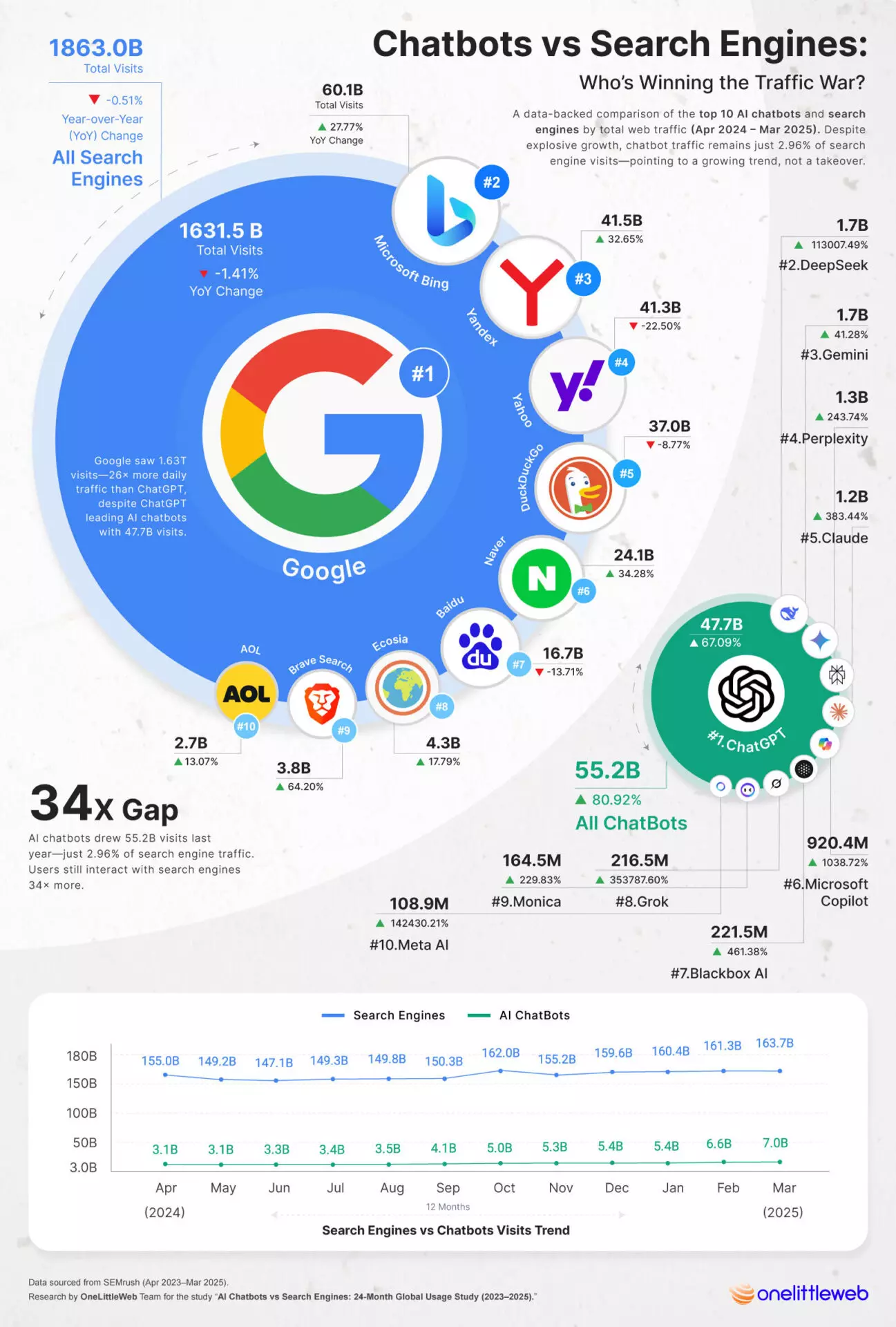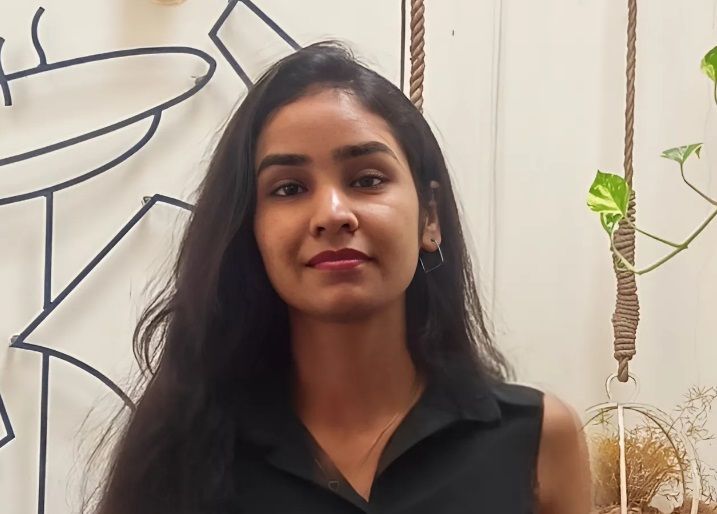AI chatbots have grown rapidly, with an 80.92% increase to 55.2 billion visits from April 2024 to March 2025. Despite this, traditional search engines remain dominant, receiving 1.86 trillion visits in the same period. Google leads with 1.63 trillion visits, while ChatGPT holds 86.32% of chatbot traffic. Chatbots complement but do not yet replace search engines.

A recent in-depth study by OneLittleWeb reveals that despite the fast growth of AI chatbots, traditional search engines continue to dominate the global web traffic landscape. The analysis compares two years of data from April 2023 to March 2025, tracking visits to the top 10 AI chatbots and the top 10 search engines worldwide. The findings highlight key trends shaping the future of online information retrieval and the evolving relationship between AI conversational tools and classic search platforms.
The meteoric rise of AI chatbots
The past year has witnessed unprecedented growth in AI chatbot adoption, with the top 10 platforms collectively recording 55.2 billion visits – an 80.92% increase compared to the previous 12-month period. This surge underscores the growing public appetite for conversational AI interfaces that provide immediate, context-aware responses without requiring users to sift through multiple search results.
ChatGPT continues to dominate this emerging sector, commanding an 86.32% market share with 47.7 billion annual visits. The platform’s success stems from its continuous innovation, including the rollout of GPT-4.1 and seamless integration into various productivity workflows. Notably, ChatGPT now processes approximately 185.2 million daily queries, demonstrating its entrenched position in users’ digital routines.
Beyond OpenAI’s flagship product, several other AI assistants have achieved remarkable growth trajectories:
- DeepSeek experienced an astronomical 113,007% year-over-year increase, reaching 1.7 billion visits
- Perplexity AI grew by 243.74% to 1.3 billion visits, benefiting from its source-cited answers
- Claude expanded by 383.44%, reflecting growing trust in Anthropic‘s AI assistant
- Microsoft Copilot surged by 1,038.72% following deeper integration with Windows and Office ecosystems

Search engines: Still the unquestioned leaders
Despite the chatbot sector’s impressive expansion, traditional search engines maintain overwhelming dominance in overall web traffic. The top 10 search platforms processed 1.86 trillion visits during the measurement period – just 0.51% fewer than the previous year but still 34 times more than all AI chatbots combined.
Google remains the undisputed champion of digital search, handling:
- 1.63 trillion annual visits (87.57% market share)
- 136 billion monthly queries on average
- 4.7 billion daily searches in March 2025
The minor 1.41% decline in Google’s traffic appears negligible when considering its massive scale. Moreover, the platform has shown signs of recovery since late 2024, likely due to strategic AI integrations like AI Overviews and enhanced Gemini functionality.
Other search engines displayed varied performance:
- Microsoft Bing grew by 27.77% to 60.1 billion visits
- Yandex expanded by 32.65% to 41.5 billion visits
- Naver increased 34.28% to 24.1 billion visits
- Ecosia and Brave Search grew by 17.79% and 64.20% respectively
In contrast, some platforms faced challenges:
- Yahoo declined by 22.5%
- DuckDuckGo decreased by 8.77%
- Baidu fell by 13.71%
The evolving relationship between search engines and AI chatbots
The data suggests a complex, symbiotic relationship developing between traditional search engines and AI chatbots rather than a straightforward displacement. Several key trends emerge:
Search engines are adopting AI features: Platforms like Google and Bing have successfully integrated generative AI capabilities into their core offerings. Google’s Search Generative Experience (SGE) and Bing’s Copilot functionality demonstrate how conventional search is evolving to incorporate chatbot-like interactions while maintaining link-based results.
Chatbots serve complementary functions: While chatbots excel at providing direct answers to complex queries, they haven’t replaced the comprehensive discovery process offered by search engines. Users appear to employ both tools for different purposes – chatbots for quick answers and search engines for broader research.
Regional variations in adoption: The analysis reveals significant geographical differences in platform preferences. While ChatGPT dominates globally, regional players like Yandex (Russia) and Naver (South Korea) show strong growth, suggesting localised AI and search ecosystems may continue thriving.
Niche platforms find their audiences: Privacy-focused options like Brave Search and environmentally-conscious Ecosia demonstrate that specialised value propositions can drive growth even in a market dominated by tech giants.
Implications for businesses and content creators
For digital marketers and website owners, these trends carry important ramifications:
SEO remains critical: With search engines still processing vastly more queries than chatbots, traditional search optimization maintains its importance. However, the growing prevalence of AI-generated answers necessitates adapting content strategies to appear in both conventional results and AI responses.
Structured data gains importance: As search engines incorporate more AI features, implementing schema markup and other structured data helps ensure content is properly interpreted and surfaced in various formats.
Conversational content becomes valuable: The rise of chatbots suggests users increasingly prefer direct, conversational answers. Content creators should consider adapting their material to address questions more naturally and comprehensively.
Diversification across platforms: Relying solely on organic search traffic carries growing risks. Developing presence across multiple platforms – including emerging AI tools – helps future-proof digital strategies.
About the data
The analysis draws from global web traffic data aggregated by OneLittleWeb using sources including Semrush and aitools.xyz, covering the period from April 2023 to March 2025. It examines usage across the leading 10 AI chatbots and 10 search engines, providing a comprehensive view of market dynamics and user behaviour shifts in the evolving digital landscape.

Himani Verma is a seasoned content writer and SEO expert, with experience in digital media. She has held various senior writing positions at enterprises like CloudTDMS (Synthetic Data Factory), Barrownz Group, and ATZA. Himani has also been Editorial Writer at Hindustan Time, a leading Indian English language news platform. She excels in content creation, proofreading, and editing, ensuring that every piece is polished and impactful. Her expertise in crafting SEO-friendly content for multiple verticals of businesses, including technology, healthcare, finance, sports, innovation, and more.










